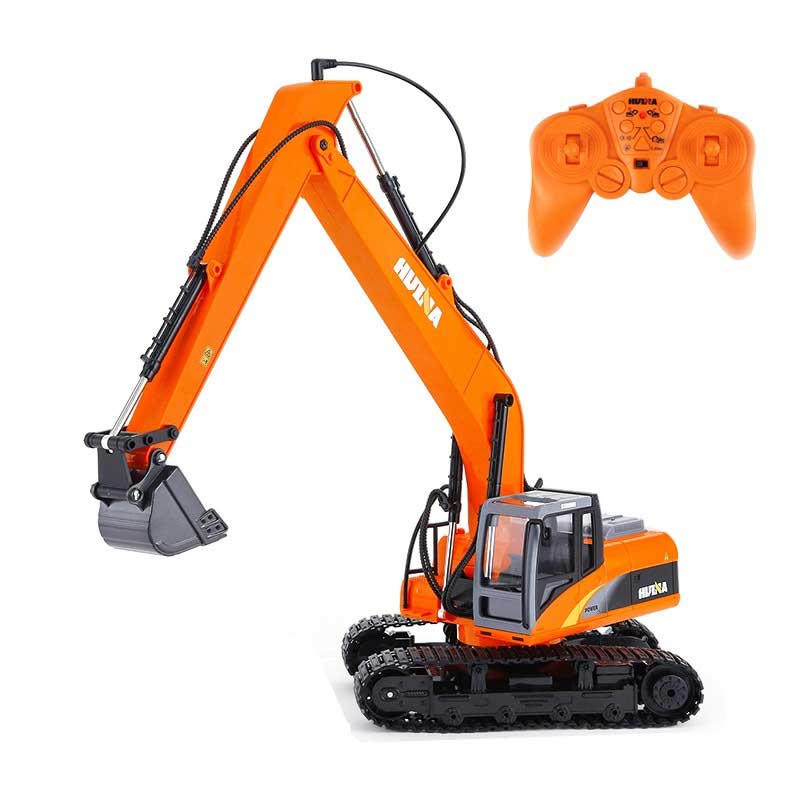Comprehending Just How Excavator Works and Its Impact on Performance
Excavators play a vital function in building and mining operations, counting on a complicated interaction of mechanical and hydraulic systems. Their capacity to do a range of jobs rests on both their layout and the innovation integrated within. Comprehending these elements can significantly impact functional efficiency and efficiency. As advancements proceed to reshape the industry, one must consider just how these modifications will certainly influence future practices and performance.
The Basics of Excavator Mechanics

The Function of Hydraulic Equipments in Excavators
At the heart of excavator procedure exists the hydraulic system, which plays a pivotal role in powering the machine's functions and motions. This system uses pressurized hydraulic liquid to transfer power, enabling various actions such as excavating, training, and swinging. By using the principles of hydraulics, excavators can carry out tasks with exceptional accuracy and pressure, improving total operational efficiency.The hydraulic system contains vital parts, consisting of pumps, valves, and cylinders, which interact to manage the circulation and instructions of the liquid. When the driver engages the controls, the hydraulic liquid is directed to certain cylinders, converting the operator's commands into physical motion. This mechanism enables smooth and receptive actions, which are crucial in building and excavation atmospheres. double e volvo rc excavator. The efficiency of the hydraulic system directly impacts the productivity and flexibility of the excavator, making it a vital component in modern-day excavation procedures
Key Elements of an Excavator
Understanding the vital elements of an excavator is crucial for comprehending just how this effective device runs. An excavator includes a number of significant components, consisting of the undercarriage, home, bucket, arm, and boom. The undercarriage gives stability and mobility, typically including wheels or tracks to navigate different surfaces. Your house consists of the engine and hydraulic systems, allowing the operator to control motion and power the equipment. The boom extends from your house, enabling upright reach, while the arm attaches to the bucket, assisting in excavating and lifting operations.Additionally, the taxi houses the driver, equipped with controls for exact handling. Each of these parts plays an essential duty in the excavator's overall performance, adding to its effectiveness and effectiveness on construction sites. Understanding these parts assists in optimizing and keeping excavator efficiency, ensuring tasks are completed safely and efficiently.
Accessory Flexibility and Its Advantages
Attachment flexibility is an essential element of excavators, allowing drivers to switch over between different devices customized for specific tasks. This adaptability not only improves job effectiveness however additionally adds to cost-effectiveness by reducing the need for several devices. Comprehending the various sorts of add-ons offered can considerably affect the general efficiency and capability of an excavator on task sites.
Types of Attachments
While excavators are primarily recognized for their digging abilities, their true convenience depends on the vast selection of accessories readily available. These accessories improve the excavator's performance, permitting it to perform numerous tasks past excavation. Common accessories include buckets (for digging and scooping), hydraulic thumbs (for grasping materials), and augers (for piercing holes) Grapples are made use of for relocating and taking care of debris, while rippers can damage up hard surface areas. Other specialized add-ons, such as trenchers and plows, make it possible for excavators to adapt to particular job requirements. This diversity not just boosts the device's utility throughout different sectors, consisting of demolition, landscape design, and building, but additionally enables operators to customize their tools to satisfy particular task demands effectively.
Enhanced Work Effectiveness
Optimizing job effectiveness is a primary benefit of utilizing various excavator add-ons. Different add-ons allow an excavator to do multiple tasks without needing to switch tools, saving beneficial time and labor. For example, utilizing a hydraulic hammer can damage concrete while a container accessory can excavate dirt, allowing a smooth workflow. This flexibility minimizes downtime related to tools changes and improves efficiency on-site. In addition, specialized attachments improve precision in jobs such as grading or landscape design, resulting in better results. The capability to adapt to various job requirements not only improves operations but also reduces the need for additional equipment, ensuring that jobs are finished promptly and effectively. On the whole, attachment versatility considerably contributes to increased work performance in excavation job.
Cost-Effectiveness and Flexibility
Cost-effectiveness is a substantial advantage of utilizing versatile excavator add-ons. These add-ons enable a solitary excavator to do several tasks, lowering the demand for added equipment and labor - double e volvo rc excavator. By switching over in between pails, hammers, and grapples, drivers can take on numerous jobs, from digging to demolition, thereby maximizing devices use. This versatility not only decreases functional expenses but additionally decreases downtime associated with transforming tools. Furthermore, the ability to tailor excavators with specialized accessories enhances performance, as they can efficiently handle varied tasks according to task demands. To end, the combination of cost-effectiveness and versatility in excavator accessories adds to improved functional efficiency and source allotment in building and construction and excavation jobs

Advanced Modern Technology in Modern Excavators
Modern excavators are progressively geared up with advanced technology that transforms excavation procedures. Automation improves procedures, while improved fuel efficiency decreases functional expenses. Additionally, smart control systems improve accuracy and safety, noting a considerable evolution in excavation devices.
Automation in Excavation Processes
As excavation modern technology progresses, automation has become an important component in boosting efficiency and accuracy on job sites. Modern excavators are equipped with advanced automated systems that help with jobs such as grading, digging, and trenching with marginal operator treatment. These systems utilize sensors, GPS, and device discovering algorithms to ensure precise placing and depth control, substantially reducing the margin for mistake. Furthermore, automation enables operators to concentrate on strategic decision-making rather than hands-on controls, bring about enhanced performance in general. Such developments not only simplify process however additionally enhance safety and security by reducing human mistake in intricate operations. The integration of automation in excavation processes represents a significant improvement in building and construction modern technology, driving the sector in the direction of better efficiency and effectiveness.
Enhanced Fuel Efficiency
Developments in innovation have Continue also resulted in significant improvements in fuel performance for contemporary excavators. Modern machines are equipped with advanced engines that enhance power output while decreasing fuel consumption. These engines utilize innovative combustion innovations, such as turbocharging and direct gas injection, to boost efficiency and effectiveness. Additionally, lightweight products in building and construction lower total weight, enabling less energy expense during operation. The intro of variable speed controls makes it possible for drivers to change engine performance according to details jobs, even more minimizing gas use. As an outcome, these improvements not only lower functional prices however also add to ecological sustainability by reducing discharges. In general, enhanced gas efficiency in useful site excavators is an important growth that boosts productivity and financial practicality in the building sector.
Smart Control Solution
While drivers navigate progressively intricate job websites, wise control systems in excavators have arised as vital devices for improving performance and precision. These innovative technologies make use of sensors and formulas to monitor different criteria such as load weight, surface problems, and operational performance. By instantly changing hydraulic features, smart systems enhance equipment performance, causing improved efficiency and minimized wear on parts. Furthermore, operators gain from instinctive interfaces that supply real-time responses and diagnostics, enabling informed decision-making. This combination of modern technology not just streamlines procedures yet likewise lessens human error, adding to more secure job settings. As the construction market remains to develop, wise control systems will certainly play an essential function in forming the future of excavator performance and performance.
Enhancing Functional Performance With Excavators
Excavators play an essential role in enhancing operational efficiency across various construction and excavation projects. Their convenience permits for numerous jobs, consisting of training, digging, and click for more info material handling, which streamlines operations and lowers the demand for extra devices. With powerful hydraulic systems, excavators can perform heavy-duty tasks with accuracy, substantially reducing the time required to complete tasks. The assimilation of sophisticated innovation, such as GPS and automated controls, further enhances their operation, allowing drivers to attain higher accuracy and lower product waste. Furthermore, modern excavators are designed to consume less fuel and lessen discharges, adding to both expense savings and ecological sustainability. By making use of excavators efficiently, building teams can enhance efficiency, meet project target dates, and improve total site management. This multifunctionality and performance make excavators vital tools in the contemporary construction landscape.
The Future of Excavators in Building and Mining Industries
As the construction and mining sectors progress, the future of excavators is positioned for considerable makeover driven by technical innovation and altering functional needs. Advancements in automation and expert system are reshaping excavator capacities, enabling boosted precision and effectiveness in procedures. Autonomous excavators are emerging, lowering the demand for human intervention and reducing the risk of accidents.Moreover, the assimilation of telematics and IoT technology allows real-time surveillance of machine performance and predictive upkeep, maximizing uptime. Environment-friendly designs, including hybrid and electrical versions, are gaining traction, lining up with sustainability goals within the industry.Additionally, using innovative products and lighter designs enhances fuel effectiveness while keeping efficiency standards. As these trends development, excavators will certainly play a vital role in meeting the boosting needs for efficiency and security in building and mining, eventually changing functional landscapes.
Regularly Asked Inquiries
Exactly How Do Weather Condition Conditions Influence Excavator Efficiency?

Climate condition greatly affect excavator efficiency, as rainfall and mud can hinder grip and stability, while severe temperature levels may influence hydraulic systems. Operators needs to adapt to these variables to assure excellent performance and safety throughout operations.
What Security Measures Should Operators Adhere To While Using Excavators?
Precaution for excavator operators consist of putting on suitable individual safety equipment, carrying out pre-operation inspections, making sure proper interaction with ground employees, maintaining a secure range from overhead dangers, and adhering to established functional methods to stop mishaps.
Just How Commonly Should Excavators Be Maintained for Optimal Efficiency?
Excavators ought to be maintained on a regular basis to ensure peak efficiency, commonly every 250 operating hours or as specified by the producer. Routine checks improve integrity, avoid unforeseen failures, and expand the life-span of the equipment.
What Is the Typical Lifespan of an Excavator?
The average lifespan of an excavator normally varies from 10,000 to 15,000 hours of operation. Elements affecting durability consist of maintenance methods, running conditions, and the quality of the machine itself, impacting general efficiency and effectiveness.

Can Excavators Operate Uneven Terrain Effectively?
Excavators can operate successfully on unequal surface as a result of their expressed designs and adjustable tracks. These features allow them to preserve stability and grip, making it possible for efficient operation in tough environments typically come across in building and landscape design jobs. Each of these parts plays an important role in the excavator's total capability, contributing to its effectiveness and efficiency on construction websites. Making best use of job performance is a primary benefit of utilizing numerous excavator attachments. While operators browse increasingly intricate job sites, smart control systems in excavators have actually arised as important tools for enhancing effectiveness and accuracy. Excavators play a crucial duty in enhancing operational effectiveness throughout numerous construction and excavation projects. Advances in automation and artificial intelligence are reshaping excavator capabilities, permitting for improved precision and performance in operations.
Comments on “The Best Benefits of Using a remote control excavator in Demolition Tasks”